Waste Not, Waste Not
"There are children starving in China," my grandmother would say whenever she wanted me to finish my plate of food. I never quite figured out what difference my leftover lasagna would make to those children, or why my eating it would feed them, but I do understand that my grandmother was trying to make a point about how much food we waste in this country. As a child of the depression, the carelessness with which my generation treats the food we eat - more as a sop to boredom than real sustenance - appalled her.

source
Americans waste an estimated 27 percent of the food available for consumption, according to a government study, or about a pound of food every day for every American. Part of the problem is that we buy far more than we need, loading up a cart at least once a week, and a lot of it gets spoiled or simply thrown away because we don't want it anymore. A study by the Department of Agriculture estimated that in the year 1995, the last time numbers were recorded, 96.4 billion pounds of the 356 billion pounds of edible food in the United States were never eaten. Compare that to the more than 852 million people - about 13 percent of the world population - who go hungry each day, according to the Rome-based Food and Agriculture organization (FAO).
It looks like Grandma Dot had a point.
In order to avoid wasting food, keep track of what you have and what you really need. Stick a notepad on your fridge with a running tally of the basics (milk, eggs, bread, meat, vegetables, fruit, etc.) and scratch off items as you use them. That way, you'll know exactly what you need to replenish at the grocery store and you'll be less prone to impulse buys. You'll also know exactly what is in your fridge when you go to prepare a meal, so you can consume items before they spoil.
Store your food properly to prolong its shelf-life. Carefully place perishables in sealed, reusable containers and organize them in your refrigerator by expiration date. By keeping more recently purchased items in the back, you'll use the older ones first.
Be realistic about what you consume also. My mother likes to cook for 40 people, even if she's only having four or five over for dinner, and a lot of the leftovers get thrown away. Manage portion sizes and alter recipes according to how many people will be eating them. If that sounds challenging, go to allrecipes.com, a site that helps you adjust a particular dish to the exact number of servings you would like. When you do have leftovers, store them properly so you won't end up throwing them out later on anyway.
Food is a precious commodity, and should be treated with gratitude and respect. Many families say grace before a meal as a sign of appreciation that they have food to eat at all. Whether that is part of your routine or not, take the time to consider what you eat, and more importantly, what you don't.
I've always thought there should be some kind of service where you can donate leftover food, even already cooked and perishable foods.
Maybe through vacuum packaging and dry ice storage or something- some way to preserve the food long enough to get to a hungry person.
I feel like the logistics involved would be near impossible to action though :(
I have noticed that people in this country tend to cook too much at a time.. perhaps food conservation and sustainability should be taught in schools